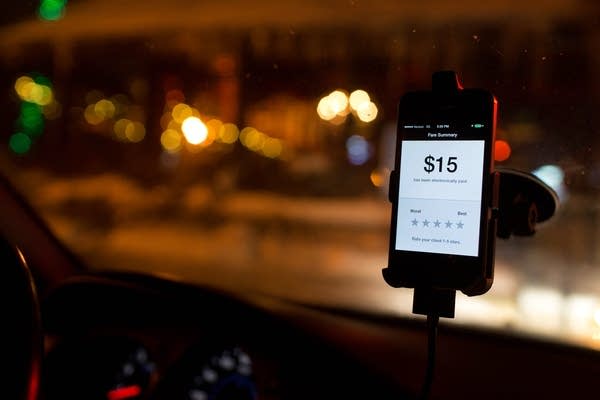Uber, Lyft ride share programs put Minneapolis council in tight spot

Go Deeper.
Create an account or log in to save stories.
Like this?
Thanks for liking this story! We have added it to a list of your favorite stories.
The city of Minneapolis is trying to figure out how to regulate cell phone apps that turn personal cars into virtual taxis.
Smartphone apps like Lyft and Uber connect people looking for rides with drivers who want to make extra money by turning their cars into cabs. But Minneapolis cab companies argue the apps represent unfair competition, and they want the city to hold the app makers to the same standards as taxi services.
Once you've downloaded one of the the apps to your smartphone, and typed in a credit card number, you can hail a car with the tap of your finger. Once you do, someone like Dave MacKenzie may show up behind the wheel. He retired a few years ago, and now does this for Lyft mostly as a way to keep busy.
•Related: Uber, other ride apps shake up Twin Cities transportation
Turn Up Your Support
MPR News helps you turn down the noise and build shared understanding. Turn up your support for this public resource and keep trusted journalism accessible to all.
MacKenzie doesn't consider what he does taxi service. For him, Lyft is more like a club, and he likes his passengers to sit up front with him.

"I think it's more of a community thing, because you're actually getting engaged in conversation, and you're learning about people, and you can become friends with people," he said.
But technically, what MacKenzie is doing is against the law in Minneapolis, because he's not licensed as a taxi driver. Now City Council Member Jacob Frey is trying to find a way to legalize and regulate the ride-sharing industry.
"We could have very well taken the easy way out, and many other cities have taken the easy way out. The easy way out is to do nothing" Frey said.
Minneapolis isn't the only city weighing regulations. Chicago and St. Paul, are also considering rules for ride sharing. California has already passed a statewide law. Seattle recently placed a cap on the number of ride share drivers allowed in the city.
Frey has proposed an ordinance that would require the app manufacturers to register with the city and pay $35,000 a year in fees. That money would go to hire an inspector to ensure the cars are up to code, and that the companies' background checks and insurance policies are sufficient.
But taxi drivers like Zack Williams say that's not enough.
"They're cab drivers. We need one ordinance for all of this transportation, because we're the exact same business," Williams said.
While cabs are inspected twice a year at a city-operated garage, the ride share companies handle their own inspections. Lyft has experienced drivers from its network look over the vehicles of new applicants. Uber sometimes just relies on photographs of the car.
Cab companies are also required to have wheelchair accessible vehicles in their fleets. Under Frey's proposal, rideshare companies would pay a surcharge if they can't do the same -- a measure advocates for people with disabilities call insufficient.
And while individual cab drivers have to carry expanded liability insurance, Lyft and Uber cover all their drivers under a single insurance policy. That saves would-be drivers from the trouble and expense of applying for coverage.
Lyft's executive vice president Jim Black says that for ride-sharing to work, it needs to be simple for large numbers of people to sign up as what he called "casual drivers."
"So I ask, and I think it's very important, that we set up a way to bring on drivers that is relatively easy -- something that maintains safety, but not going through a lot of steps," Black said.
Black says the city should apply that same logic of streamlined regulation to other transportation providers.
Council Member Abdi Warsame agrees. He says at the same time the city regulates ride sharing, it should also remove some of the rules that make life difficult for cabbies.
"If you're taxi driver, you can't park anywhere downtown. You can't park on a meter. You can only park on cabstands, and there's not enough cabstands. And they get tickets. They get citations, and they feel they should get some of the same privileges that we're trying to offer Uber and Lyft."
Warsame is working with Frey on the measure. Frey says the goal is to allow taxis and rideshare apps to coexist. And if that succeeds, Frey argues it's possible for everyone to win, because more transportation options make it easier for people to live without owning a car.
"They feel comfortable saying, you know what, I have these options available to me, I can take light rail if I need to, I can take streetcar if I need to, I can take taxi or ridesharing, and once they give up their car, everybody benefits in the public transportation world."
Frey's ordinance will come back before the city council in two to four weeks.


